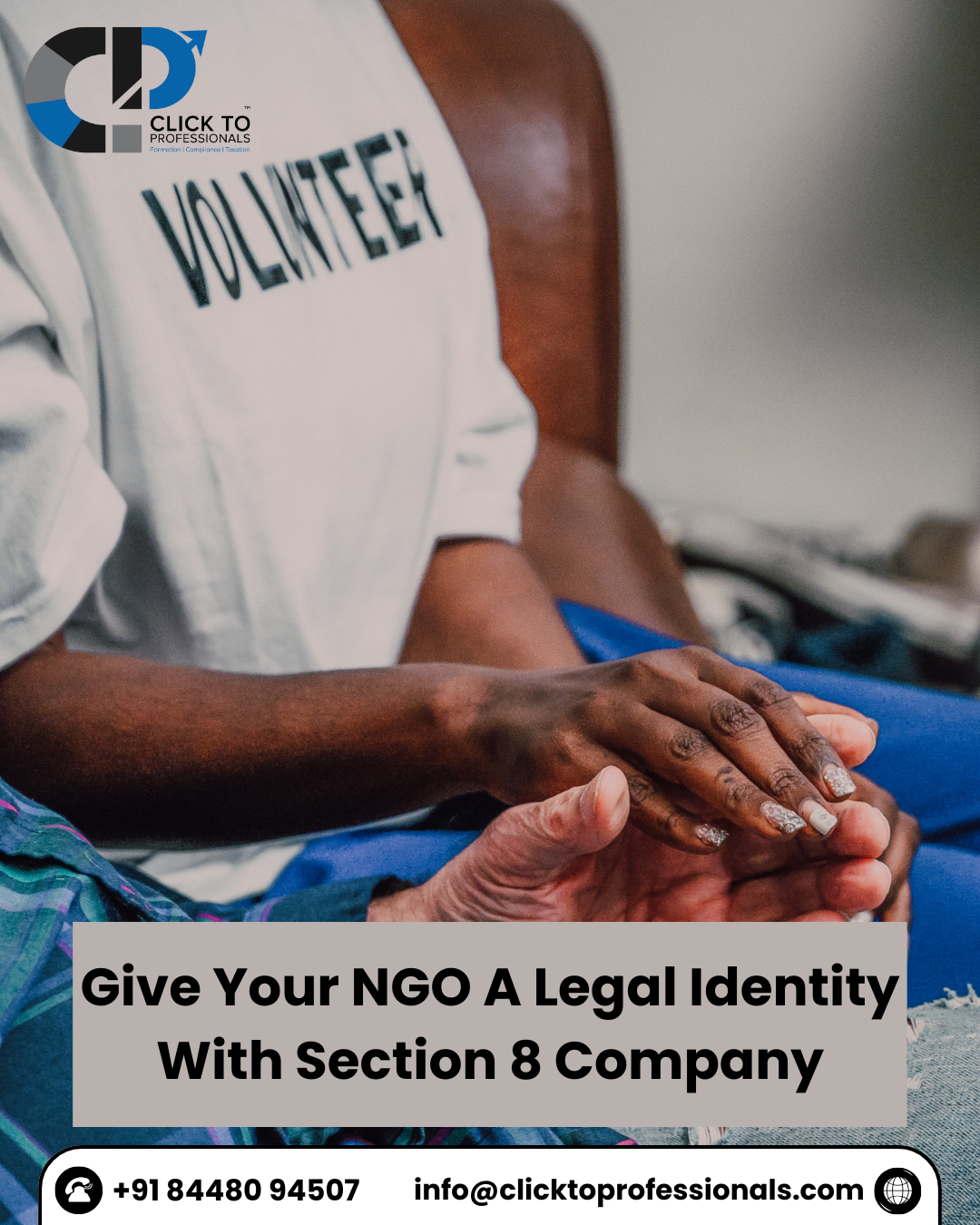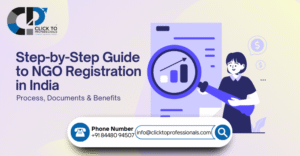
Section 8 Company Registration is one of the most trustworthy and professional ways to form an NGO in India. It gives your group a solid legal base and makes sponsors, partners, and government authorities trust you more. You can register an NGO as a Trust or Society, but it’s better to choose a company that is incorporated under Section 8 because it is more trustworthy, open, and follows corporate rules.
This blog will tell you all you need to know about starting a Section 8 company, including the most important things you need to do to register your Section 8 company and why getting 80G and 12A registration for your Section 8 company is so important for your NGO’s success.
What does it mean to register a Section 8 company?
Section 8 Company Registration is a way to start a non-profit group that helps with things like education, social welfare, healthcare, the arts, science, and the environment. It is part of the Companies Act, 2013. Companies that are registered under Section 8 can’t give their members any of their profits. Instead, all of the money the company makes must be spent to reach its goals.
When you register your NGO as a Section 8 corporation, it gives it a legal identity that makes it more trustworthy to donors and funding agencies. Many social entrepreneurs choose to register as a section 8 NGO for this reason.
Why Choose Section 8 for Your Company?
Before we talk about what it takes to start a sec 8 company, let’s talk about why it’s better than a Trust or Society:
Companies that are registered under Section 8 are more trustworthy since they follow the Companies Act.
- Separate Legal Entity: After you register your NGO as a company under Section 8, it becomes its own legal entity that can own property and create bank accounts.
- Limited Liability: Members are not responsible for the company’s debts.
- Tax Benefits: After you register your Section 8 corporation, you can also apply for 12A and 80G registration, which will give your NGO and its donors tax breaks.
- Credibility: Corporate contributors choose groups with section 8 NGO registration because they follow the rules and have good governance.
Important Things to Know About Registering a Section 8 Company
To register a Section 8 company, you must meet the following requirements:
1. Goals for charity
The major goal of your group should be to help the community, education, the arts, science, or other non-profit goals. Companies that are registered under Section 8 can’t make money.
2. Minimum number of members
To start a sec 8 company, you need at least two directors and two stockholders. A person can be both a director and a shareholder.
3. No Distribution of Dividends
Companies registered under Section 8 can only utilize their profits to further the goals of the organization.
4. Following the MCA
To register a Section 8 corporation, you need permission from the Ministry of Corporate Affairs (MCA) and must follow its rules for compliance.
The Steps to Start a Section 8 Company
Here’s how to register a Section 8 company in India:
Step 1: Get your Digital Signature Certificate (DSC)
Directors need DSC to sign and send in forms online for Section 8 company registration.
Step 2: Get a Director Identification Number (DIN)
All directors of the proposed section 8 company registration must have a DIN.
Step 3: Reserve a Name
Pick a name that is different from others and fits with the goals of your NGO. Then, reserve it on the MCA portal.
Step 4: Write the MoA and AoA
The Memorandum of Association (MoA) and Articles of Association (AoA) spell out the rules and goals of your Section 8 NGO registration.
Step 5: Get a License
To get the license you need to start a section 8 company, send Form INC-12 to the MCA.
Step 6: Send in the forms to incorporate.
To finish section 8 of the company registration process, fill out SPICe+ forms. You will get a Certificate of Incorporation if your application is granted.
After this, your NGO will be formally listed as one of the Section 8 corporations.
Documents Needed to Register a Section 8 Company
To finish registering your section 8 corporation, you will need:
- Directors’ PAN card
- Aadhaar card
- Proof of address
- Pictures the size of a passport
- Proof of registered office
- MoA and AoA
These papers make sure that Section 8 enterprises are following the law and being open about their business.
Why Section 8 Companies Need to Register for 12A
After your NGO has formed a Section 8 company, it is important to apply for 12A registration. This registration under the Income Tax Act means that your NGO doesn’t have to pay taxes on its income. If you don’t have 12A, your NGO would be taxed like any other business, which is not what a non-profit organization is supposed to do.
Advantages of registering for Section 8 Company 12A
- Not having to pay income tax
- Eligibility for funding from international and government agencies
- Makes donors trust you more
Why do you need to register for 80G for a Section 8 company?
You should apply for 80G registration for your Section 8 company after you have registered it and gotten approval from 12A. This lets people and businesses who give money to your NGO get tax breaks, which makes them want to give more.
Many donors may not want to give to a Section 8 firm that doesn’t have 80G registration because they won’t obtain tax breaks.
Requirements for Compliance After Registering a Section 8 Company
You still have to follow the rules for compliance after you finish section 8 company incorporation to avoid penalties:
- Filing yearly returns with the MCA
- Keeping accurate records and audits
- Having board meetings on a regular basis
As per Income Tax laws, renewing 12A registration for Section 8 firm and 80G registration for Section 8 company
Things to Avoid When Registering a Section 8 Company
- Not writing the MoA and AoA correctly
- Picking a name without first checking to see if it’s available
- Not registering for taxes, such 12A registration for a Section 8 firm or 80G registration for a Section 8 company
- Not following the rules after registering a business under Section 8
The Best Choice for NGOs Is to Register as a Company Under Section 8
In India, the most trustworthy and open way for NGOs to register is as a Section 8 company. The Companies Act and the MCA govern them, which makes sure that they are accountable and professional. You can get tax breaks, overseas donations, and corporate sponsorships for your organization if you choose section 8 NGO registration.
Conclusion
It takes meticulous planning and following the law to start an NGO. If you want to make a significant difference in society with honesty and credibility, Section 8 Company Registration is the finest way to go. Make sure you meet all the requirements when you form a Section 8 company. You also need to follow MCA standards and apply for 12A registration for Section 8 companies and 80G registration for Section 8 companies. Following these measures can help your NGO last longer and get more donations.
So, if you really want to make a difference, choose to incorporate your business as a sec 8 company now. It is the most professional and safe way to start a successful non-profit in India.
Contact Us:
Call us at +91 84480 94507 or email us at info@clicktoprofessionals.com for any queries.
Choose Click To Professional – Your Partner in Business Success.
Spotted for you: Companies Registered Under Section 8: Key Benefits and Compliance for NGO Registration Success

